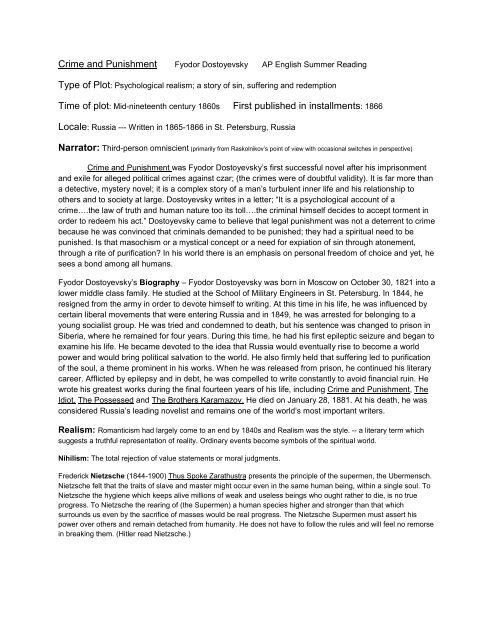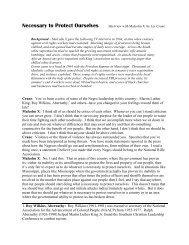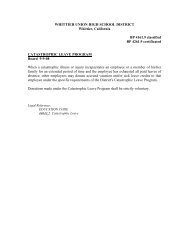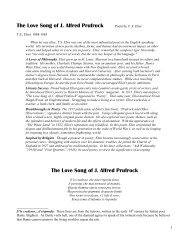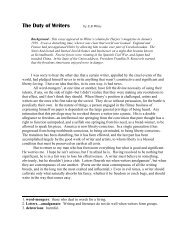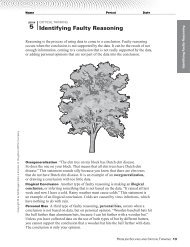Crime and Punishment First published in installments: 1866
Crime and Punishment First published in installments: 1866
Crime and Punishment First published in installments: 1866
Create successful ePaper yourself
Turn your PDF publications into a flip-book with our unique Google optimized e-Paper software.
<strong>Crime</strong> <strong>and</strong> <strong>Punishment</strong> Fyodor Dostoyevsky AP English Summer Read<strong>in</strong>g<br />
Type of Plot: Psychological realism; a story of s<strong>in</strong>, suffer<strong>in</strong>g <strong>and</strong> redemption<br />
Time of plot: Mid-n<strong>in</strong>eteenth century 1860s <strong>First</strong> <strong>published</strong> <strong>in</strong> <strong>in</strong>stallments: <strong>1866</strong><br />
Locale: Russia --- Written <strong>in</strong> 1865-<strong>1866</strong> <strong>in</strong> St. Petersburg, Russia<br />
Narrator: Third-person omniscient (primarily from Raskolnikov’s po<strong>in</strong>t of view with occasional switches <strong>in</strong> perspective)<br />
<strong>Crime</strong> <strong>and</strong> <strong>Punishment</strong> was Fyodor Dostoyevsky’s first successful novel after his imprisonment<br />
<strong>and</strong> exile for alleged political crimes aga<strong>in</strong>st czar; (the crimes were of doubtful validity). It is far more than<br />
a detective, mystery novel; it is a complex story of a man’s turbulent <strong>in</strong>ner life <strong>and</strong> his relationship to<br />
others <strong>and</strong> to society at large. Dostoyevsky writes <strong>in</strong> a letter; “It is a psychological account of a<br />
crime….the law of truth <strong>and</strong> human nature too its toll….the crim<strong>in</strong>al himself decides to accept torment <strong>in</strong><br />
order to redeem his act.” Dostoyevsky came to believe that legal punishment was not a deterrent to crime<br />
because he was conv<strong>in</strong>ced that crim<strong>in</strong>als dem<strong>and</strong>ed to be punished; they had a spiritual need to be<br />
punished. Is that masochism or a mystical concept or a need for expiation of s<strong>in</strong> through atonement,<br />
through a rite of purification? In his world there is an emphasis on personal freedom of choice <strong>and</strong> yet, he<br />
sees a bond among all humans.<br />
Fyodor Dostoyevsky’s Biography – Fyodor Dostoyevsky was born <strong>in</strong> Moscow on October 30, 1821 <strong>in</strong>to a<br />
lower middle class family. He studied at the School of Military Eng<strong>in</strong>eers <strong>in</strong> St. Petersburg. In 1844, he<br />
resigned from the army <strong>in</strong> order to devote himself to writ<strong>in</strong>g. At this time <strong>in</strong> his life, he was <strong>in</strong>fluenced by<br />
certa<strong>in</strong> liberal movements that were enter<strong>in</strong>g Russia <strong>and</strong> <strong>in</strong> 1849, he was arrested for belong<strong>in</strong>g to a<br />
young socialist group. He was tried <strong>and</strong> condemned to death, but his sentence was changed to prison <strong>in</strong><br />
Siberia, where he rema<strong>in</strong>ed for four years. Dur<strong>in</strong>g this time, he had his first epileptic seizure <strong>and</strong> began to<br />
exam<strong>in</strong>e his life. He became devoted to the idea that Russia would eventually rise to become a world<br />
power <strong>and</strong> would br<strong>in</strong>g political salvation to the world. He also firmly held that suffer<strong>in</strong>g led to purification<br />
of the soul, a theme prom<strong>in</strong>ent <strong>in</strong> his works. When he was released from prison, he cont<strong>in</strong>ued his literary<br />
career. Afflicted by epilepsy <strong>and</strong> <strong>in</strong> debt, he was compelled to write constantly to avoid f<strong>in</strong>ancial ru<strong>in</strong>. He<br />
wrote his greatest works dur<strong>in</strong>g the f<strong>in</strong>al fourteen years of his life, <strong>in</strong>clud<strong>in</strong>g <strong>Crime</strong> <strong>and</strong> <strong>Punishment</strong>, The<br />
Idiot, The Possessed <strong>and</strong> The Brothers Karamazov. He died on January 28, 1881. At his death, he was<br />
considered Russia’s lead<strong>in</strong>g novelist <strong>and</strong> rema<strong>in</strong>s one of the world’s most important writers.<br />
Realism: Romanticism had largely come to an end by 1840s <strong>and</strong> Realism was the style. -- a literary term which<br />
suggests a truthful representation of reality. Ord<strong>in</strong>ary events become symbols of the spiritual world.<br />
Nihilism: The total rejection of value statements or moral judgments.<br />
Frederick Nietzsche (1844-1900) Thus Spoke Zarathustra presents the pr<strong>in</strong>ciple of the supermen, the Ubermensch.<br />
Nietzsche felt that the traits of slave <strong>and</strong> master might occur even <strong>in</strong> the same human be<strong>in</strong>g, with<strong>in</strong> a s<strong>in</strong>gle soul. To<br />
Nietzsche the hygiene which keeps alive millions of weak <strong>and</strong> useless be<strong>in</strong>gs who ought rather to die, is no true<br />
progress. To Nietzsche the rear<strong>in</strong>g of (the Supermen) a human species higher <strong>and</strong> stronger than that which<br />
surrounds us even by the sacrifice of masses would be real progress. The Nietzsche Supermen must assert his<br />
power over others <strong>and</strong> rema<strong>in</strong> detached from humanity. He does not have to follow the rules <strong>and</strong> will feel no remorse<br />
<strong>in</strong> break<strong>in</strong>g them. (Hitler read Nietzsche.)
Brief Summary: <strong>Crime</strong> <strong>and</strong> <strong>Punishment</strong> is a novel written by Russian author Fyodor Dostoevsky. <strong>Crime</strong><br />
<strong>and</strong> <strong>Punishment</strong> focuses on Raskolnikov, a destitute student, who plans to kill Alyona Ivaovna, a<br />
despised money-lender <strong>in</strong> order to rid the world of her evil. Raskolnikov th<strong>in</strong>ks himself to be a gifted,<br />
<strong>in</strong>telligent man, an extraord<strong>in</strong>ary man, a superman who feels justified <strong>in</strong> his decision to murder; he sees<br />
himself above the moral constra<strong>in</strong>ts of common people. Immediately after the crime, Raskolnikov<br />
becomes ill, <strong>and</strong> is troubled by the memory of his actions, notably the unplanned murder of the<br />
pawnbroker’s sister, Lizaveta Ivanovna. <strong>Crime</strong> <strong>and</strong> <strong>Punishment</strong> portrays Raskolnikov’s thought processes<br />
<strong>and</strong> actions before <strong>and</strong> after the murders. The story depicts Raskolnikov’s desire to protect his sister<br />
Dunya from Svidrigailov, a despicable suitor, <strong>and</strong> from Luzh<strong>in</strong>, an arrogant cad. Raskolnikov develops<br />
<strong>and</strong> unexpected love for Sonya Marmeladov, a destitute prostitute, as he tries to receive redemption.<br />
Pronunciation Guide of Major Characters:<br />
Rodion Romanovich Raskolnikov: ……………………………....rod-YON ro-MANH-o-vich ras-KOL-nee-koff<br />
Pulkheria Aleks<strong>and</strong>rovna (his mother): ………………….………………. pool-Kyer-ee-a al-yek-SAN-drov-na<br />
Avdotya Romanovna (or Dunya; his sister): ……………..………. ahv-DOTE-ya ro-MANH-ov-na (Dune-ya)<br />
Dmitry Prokofich Razumkih<strong>in</strong> (his friend): ………...……………….…………………………. rahz-oo-MEEK-<strong>in</strong><br />
Kater<strong>in</strong>a Ivanovna Marmeladov (his second wife): …………………………... kat-yer-EE-na ee-VANH-ov-na<br />
Semyon Zakharych Marmeladov (father of Sonya): ……………………..………………… marm-ya-LAH-doff<br />
Sofya Semyonovna Marmeladov (or Sonya; his daughter): ………………………………………….....Son-ya<br />
Luzh<strong>in</strong>, Pyotr Petrovich (Dunya’s fiancé): ……..……………………………………………………… LOOZH-<strong>in</strong><br />
Lebezyatnikov, Andrei Semyonovich (Luzh<strong>in</strong>’s roommate): …..………………………… leb-ee-ZYAT-ni-koff<br />
Svidrigailov, Arkady Ivanovich (Dunya’s employer): …….………………………………… sfee-dree-GUY-loff<br />
Marfa Petrovna (wife of Svidrigailov): …………………………………………..……… MARF-a pye-TROV-na<br />
Alyona Ivanovna (pawnbroker): ………………………………………………...…. al-YOAN-a ee-VANH-ov-na<br />
Lizaveta Ivanovna (pawnbroker’s sister): ……………………………………. lee-za-VYET-a ee-VANH-ov-na<br />
Porfiry Petrovich (<strong>in</strong>vestigator): …………………………………………………… por-FEAR-ee pye-TROV-ich<br />
Zamyotov (police clerk): ………………………………………………………………………….. zahm-YOTE-off<br />
Ilya Petrovich (super<strong>in</strong>tendent’s auiliary, “Explosive Lieutenant”): …………………... EEL-ya pye-TROV-ich<br />
Nikodim Fomich (police district super<strong>in</strong>tendent): ………………………………….. NEEK-o-DEEM FOAM-ich<br />
Zosimov (doctor): ...…………………………………………………………………………………....zo-SEE-moff
Notations <strong>in</strong> your copy of <strong>Crime</strong> <strong>and</strong> <strong>Punishment</strong><br />
On each day of the scheduled tests for the 6 parts of this novel, I will be collect<strong>in</strong>g your copy of <strong>Crime</strong><br />
<strong>and</strong> <strong>Punishment</strong> to check the notations you are mak<strong>in</strong>g as you read. You should be highlight<strong>in</strong>g <strong>and</strong><br />
mak<strong>in</strong>g marg<strong>in</strong>al notes on the subjects listed below. Make sure that you put a color-coded key <strong>in</strong> the<br />
front of your book so that I know which highlighted sections apply to which theme.<br />
1. Everyday life <strong>in</strong> Russia: details that show how the people lived, how they treat one another.<br />
Do you f<strong>in</strong>d any stereotypes? What do they dr<strong>in</strong>k <strong>and</strong> eat? What part does religion play <strong>in</strong><br />
their lives? What occupations do you see? What seems apparent about the class structure?<br />
2. Allusions <strong>and</strong> Images: there are many allusions (Biblical primarily), images <strong>and</strong> symbols that<br />
occur over aga<strong>in</strong> <strong>in</strong> this text. Note them <strong>and</strong> look at the pattern.<br />
3. Raskolnikov <strong>and</strong> his split personality: this character is full of contradictions. Note the<br />
situations <strong>and</strong> thought patterns that make up this complex man.<br />
Questions For <strong>Crime</strong> <strong>and</strong> <strong>Punishment</strong><br />
1. How does the physical description of Raskolnikov’s liv<strong>in</strong>g conditions enhance or detract from the<br />
plot development occurr<strong>in</strong>g <strong>in</strong> this chapter?<br />
2. Describe the meet<strong>in</strong>g of Raskolnikov <strong>and</strong> Marmeladov.<br />
3. The letter from Raskolnikov’s mother puts him <strong>in</strong> an absolute rage. Why? What is <strong>in</strong> it that<br />
makes him so furious?<br />
4. Describe the dream with the mare.<br />
5. What conversation does Raskolnikov overhear that gives him new <strong>in</strong>spiration for his “project”?<br />
6. What unexpected event happens when he commits the crime? How does he h<strong>and</strong>le himself?<br />
7. How does the physical description of Raskolnikov’s liv<strong>in</strong>g conditions enhance or detract from the<br />
plot development occurr<strong>in</strong>g <strong>in</strong> this chapter?<br />
8. Describe the meet<strong>in</strong>g of Raskolnikov <strong>and</strong> Marmeladov.<br />
9. The letter from Raskolnikov’s mother puts him <strong>in</strong> an absolute rage. Why? What is <strong>in</strong> it that<br />
makes him so furious?<br />
10. Describe the dream with the mare.<br />
11. What conversation does Raskolnikov overhear that gives him new <strong>in</strong>spiration for his “project”?
12. What unexpected event happens when he commits the crime? How does he h<strong>and</strong>le himself?<br />
13. Describe the scene <strong>in</strong> the police station after Raskolnikov was summoned to appear there.<br />
14. Razhumik<strong>in</strong> becomes a foil for Raskolnikov as the novel prpgresses. What are the obvious<br />
similarities <strong>and</strong> differences between the two characters at this juncture <strong>in</strong> the book.<br />
15. Describe the discussion of the murders that took place between Raskolnikov <strong>and</strong> Zametov. At<br />
the end of the conversation, what conclusions did Zametov come to?<br />
16. Describe the death of Marmeladov.<br />
17. What is the conflict between Luzh<strong>in</strong> <strong>and</strong> Raskolnikov. Discuss both sides of the conflict <strong>in</strong> your<br />
response.<br />
18. Describe the scene <strong>in</strong> the police station after Raskolnikov was summoned to appear there.<br />
19. Razhumik<strong>in</strong> becomes a foil for Raskolnikov as the novel prpgresses. What are the obvious<br />
similarities <strong>and</strong> differences between the two characters at this juncture <strong>in</strong> the book.<br />
20. Describe the discussion of the murders that took place between Raskolnikov <strong>and</strong> Zametov. At<br />
the end of the conversation, what conclusions did Zametov come to?<br />
21. Describe the death of Marmeladov.<br />
22. What is the conflict between Luzh<strong>in</strong> <strong>and</strong> Raskolnikov. Discuss both sides of the conflict <strong>in</strong> your<br />
response.<br />
23. Discuss the new love triangle that develops at the beg<strong>in</strong>n<strong>in</strong>g of part three.<br />
24. What is the ultimatum that Rakolnikov gives to Dounia <strong>and</strong> why does he resort to that tactic?<br />
25. Describe the <strong>in</strong>teractions between Porfiry <strong>and</strong> Raskolnikov.<br />
26. What is Raskolnikov’s “Extraord<strong>in</strong>ary Man” theory?<br />
27. At the end of part three, Raskolnikov is halluc<strong>in</strong>at<strong>in</strong>g <strong>and</strong> rant<strong>in</strong>g. Expla<strong>in</strong> who <strong>and</strong> what he is<br />
rav<strong>in</strong>g about.<br />
28. Discuss the new love triangle that develops at the beg<strong>in</strong>n<strong>in</strong>g of part three.<br />
29. What is the ultimatum that Rakolnikov gives to Dounia <strong>and</strong> why does he resort to that tactic?<br />
30. Describe the <strong>in</strong>teractions between Porfiry <strong>and</strong> Raskolnikov.<br />
31. What is Raskolnikov’s “Extraord<strong>in</strong>ary Man” theory?<br />
32. At the end of part three, Raskolnikov is halluc<strong>in</strong>at<strong>in</strong>g <strong>and</strong> rant<strong>in</strong>g. Expla<strong>in</strong> who <strong>and</strong> what he is<br />
rav<strong>in</strong>g about.
33. What is Svidrigailov’s story? How did he end up <strong>in</strong> the city look<strong>in</strong>g for Dounia <strong>and</strong> why?<br />
34. How does the end of Dounia’s engagement to Luzh<strong>in</strong> come about?<br />
35. What task does Raskolnikov assign to Tazhumik<strong>in</strong> before he ab<strong>and</strong>ons his mother <strong>and</strong> sister?<br />
36. How does Porfiry deal with Raskolnikov dur<strong>in</strong>g their <strong>in</strong>terview at the police station?<br />
37. Describe the irony of the scene where Nikolai confesses to the pawnlady’s murder.<br />
38. Why are Katar<strong>in</strong>a Ivanovna <strong>and</strong> her children evicted from their apartment?<br />
39. Describe the death of Katar<strong>in</strong>a <strong>and</strong> its effect on Sonia’s life.<br />
40. Why does Raskolnikov ask Sonia to read the story of Lazarus from the Bible? What is the<br />
significance of this particular parable?<br />
41. How does Luzh<strong>in</strong> attempt to discredit Sonia? Is his scheme successful?<br />
42. What is Sonia’s reaction to Raskolnikov’s confession?<br />
What is the role of suffer<strong>in</strong>g <strong>in</strong> Part Six?<br />
a. What is Sonia’s role <strong>in</strong> the conclud<strong>in</strong>g chapter?<br />
b. What is favorable circumstances concern<strong>in</strong>g Raskolnikov come to light dur<strong>in</strong>g the trial?<br />
c. What happens to Raskolnikov’s mother dur<strong>in</strong>g the trial?


